Last month we had the pleasure of speaking with the SFU Faculty of Environment (thank you Britni!!) about Sword Fern Collective and our projects! Here's the full interview below:
1. Where is the name “Sword Fern Collective” from?
Paige: We wanted a name that reflected the Pacific Northwest and what we were trying to create. We spent a long time brainstorming names before landing on Sword Fern Collective. We both spend a lot of time outdoors, so sword ferns are a familiar sight. Now that Victor has moved to Montreal, they’re also a reminder of the West Coast. We chose ‘collective’ because all of our work is focused on building community. At events we organize, like The Art of Change, guests are as much a part of it as we or the performers are. Everyone becomes a part of the collective experience, even if it’s only for an hour or two.
Victor: I was really drawn to sword ferns because swords make me think of the adage "the pen is mightier than the sword." We are certainly in a collective and existential battle right now—a fight for climate justice, reparations, and reconciliation. I think for us, our weapon of choice is certainly not a sword, but perhaps a sword fern—I certainly believe that using ideas and restoring the relationship between people and themselves and nature are more effective than other means.
2. When did you start Sword Fern Collective and why?
Victor: Part of why we started the Sword Fern Collective was because we realized most people aren't able to access comprehensive climate knowledge. Our educational experiences with fEnv completely transformed the way we understood the climate situation. Why should this information be kept behind walls, especially when we need more than ever to mobilize climate knowledge? A post-secondary degree shouldn't be necessary. So one of Sword Fern Collective's goals is to make what we've learned more accessible.
Paige: Sword Fern is one of those funny instances where sliding into the DMs actually creates something really, really cool. In December 2022 I’d posted on Instagram about a class I’d recently taught at my old high school about hopeful climate action, and Victor messaged me asking about how we could collaborate on something similar in the future. I’d admired Victor’s writing on community-building for a while and jumped at the opportunity to create something together. All it took was one phone call to see that we both had the same passions for accessible climate education and decided to create Sword Fern Collective!
My motivation for creating Sword Fern Collective is very similar to Victor’s. FEnv gave me the tools to feel optimistic and capable in the face of the climate crisis, and I want to share that with everyone. I have also received messages from my former elementary and high school teachers that they don’t know how to talk to their students about climate change in a hopeful way. These messages broke my heart, which is how I got started talking in high schools about climate hope. I’ve found that connection is what really inspires hope, whether it's connecting people with each other, intergenerational connection, or helping youth see how their passions can connect with climate action.
3. What are some of the past or current things you are working on?
Paige: We’ll soon begin planning the next event in the Art of Change, which is pretty exciting! We’re still on a high from Feb 12, so feeling very stoked to keep that going and to explore new art forms.
I think we both want to take more time and write for Rerooting, Rerouting, I know that the past times I’ve sat down to write for the blog have been really healing. We don’t have a set formula or level of professionalism we’re trying to write from, and that’s what makes it so approachable for us and for readers. At the end of the day we’re two friends who are also trying to figure out the reality that climate change has put us in.
I also have a few talks scheduled at high schools talking about climate hope, so hoping (pun intended) to expand on that.
4. What is Rerooting, Rerouting?
Victor: Rerooting, Rerouting is our online publication where we post articles, think pieces, poetry, and other media related to the climate (you're reading it right now!!). We're really trying to introduce new, important, or interesting ideas. Our goal is really to spark dialogue and deeper reflection, so we really don't want to shy away from talking about weird or controversial topics either! We're trying to establish new understandings (re-root), and then use that to slowly collectively shift our societal values (re-route). The best thing about Rerooting, Rerouting is that you can also subscribe to it like a newsletter—so every time we post, you'll get our writing right there in your inbox.
5. What can you tell me about your Art of Change series?
Paige: The Art of Change is our in-person event series that uses the arts (music, writing, dance, theatre, photography, visual art, etc.) to help connect people with their community, the biosphere, and climate change. In our experience, climate education is often data-centric or quantitative. While accurate data is so important for decision-making it doesn’t always resonate with the public. Despite robust data from groups like the UNFCCC, we still see harmful discourse and conspiracy theories pop up which divide communities and delay climate action. This might sound airy-fairy, but we’ve noticed that climate change and the responses to it are emotionally loaded. How often is climate grief or climate anxiety acknowledged in our environmental policies? How often are our responses to climate change tied to our egos and social status?
The Art of Change series is built on the theory that the arts can tap straight into our emotional selves and spark motivation for climate action. I attended Langley Fine Arts School from Grade 1-12, so I grew up immersed in the arts and know the power they have for connecting disparate groups of people. Victor and I are also both alumni of the SFU Semester in Dialogue program, so we’ve also witnessed how dialogue can help people think deeply about “wicked problems” like climate change. We’ve Frankenstein-ed these two together to create The Art of Change.
We’ve divided our events into “chapters,” with each event exploring a different artform. Our February 12th event “Chapter One - Sounds” focused on the power of music, and our next event “Chapter Two - Words” will combine music and writing.
We’ve talked about how the Art of Change is about how the arts can create change, but also what is the ‘art’ of creating the kind of change we need for our climate future.
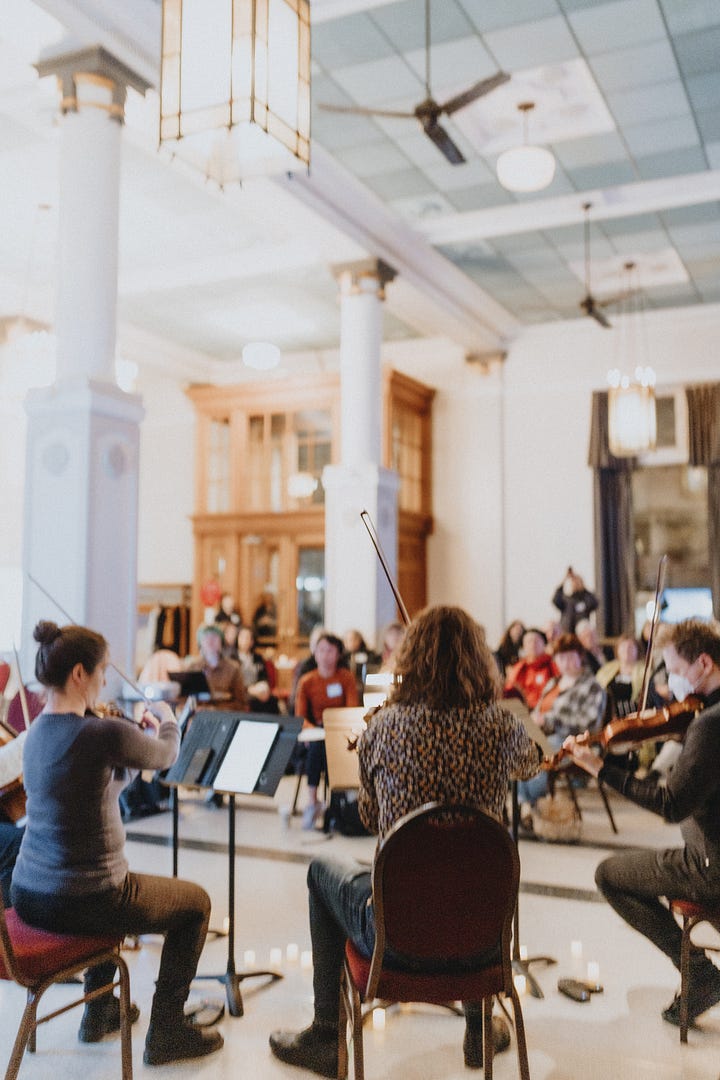
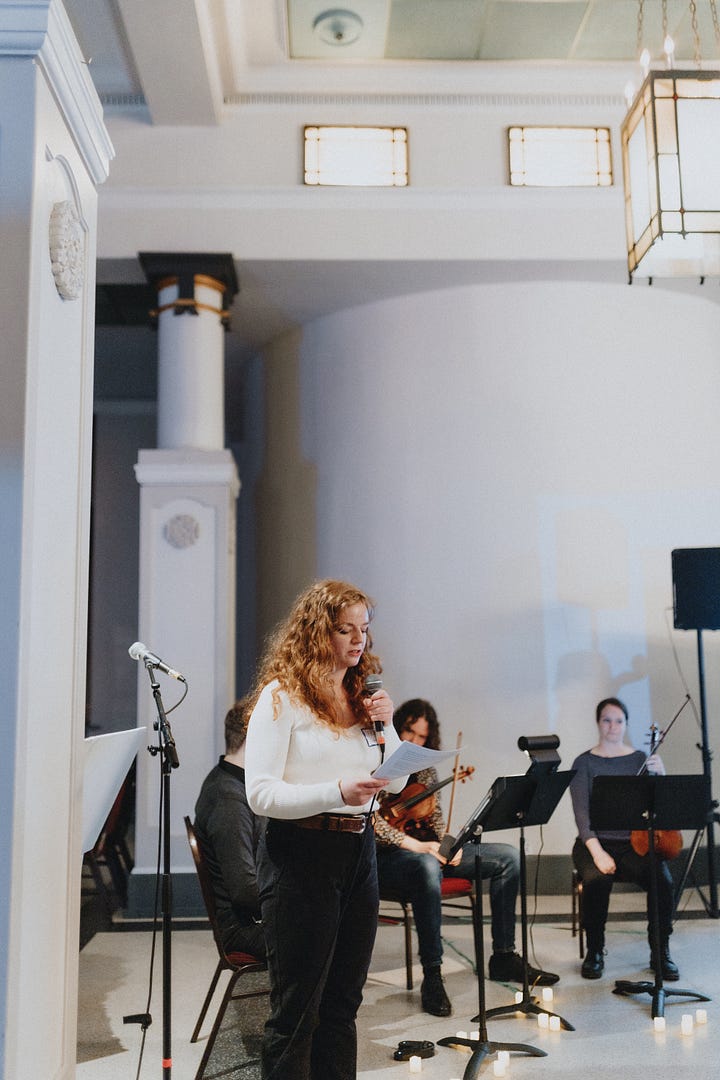
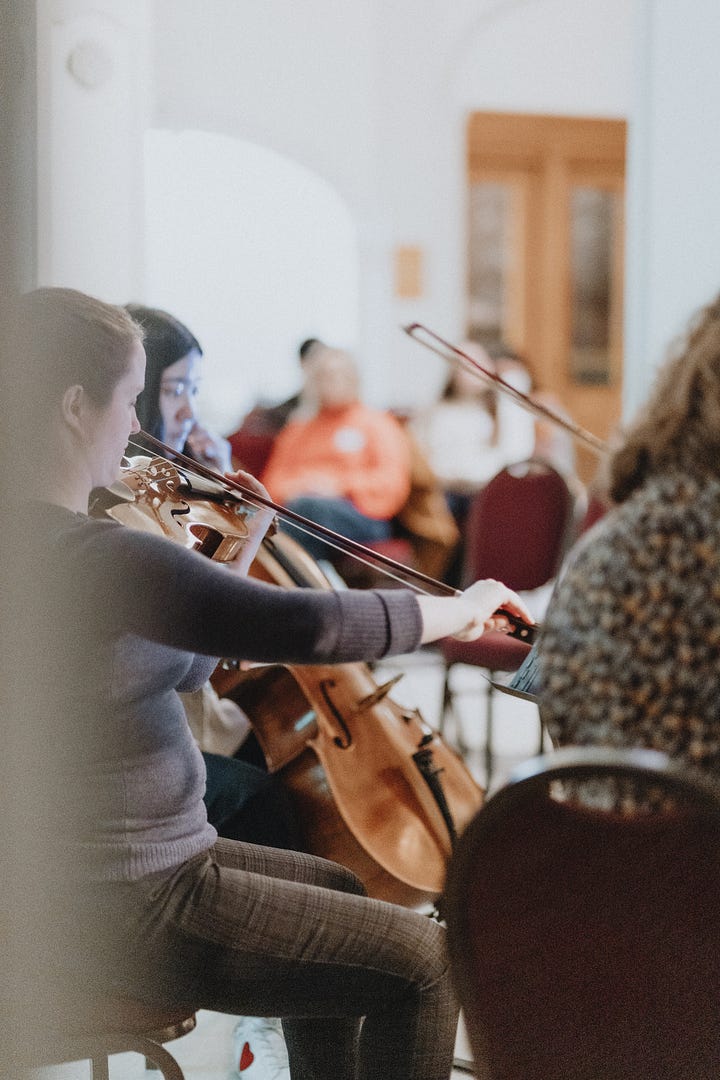
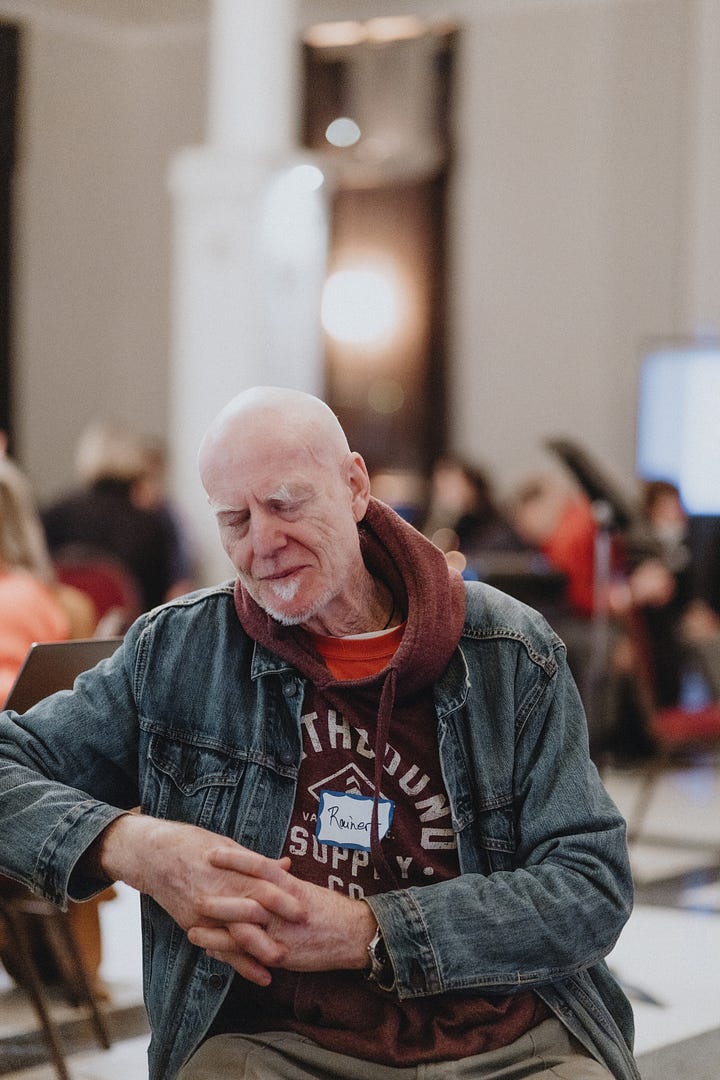
Victor: I think for me, personally, The Art of Change is really about the big collective spiritual struggle of our time. I think it's part of the human condition to sometimes really struggle with change—and right now it feels like all we seem to experience is change, in bigger and bigger magnitudes and at an increasing pace. We've never been good as a society with handling change. But the moment now calls for it. So that's the big theme that was coming up for us when Paige and I were thinking about the climate crisis. The climate crisis is not necessarily just a technical problem with a technical solution—fundamentally it's a person-problem. And people-problems require personal solutions. How do you do that? I think that starts with empowering individuals, who in turn strengthen communities—we will not address the climate crisis with a single silver bullet, rather it will be thousands of unique community-sized projects that weave together. At least that's my philosophy. So The Art of Change is really about the art of change: not the science, but the intersection between individuals and communities and the nuanced dance in between.
6. What was the goal for the event on February 12th? How did it go?
Victor: Our friend Erica Binder is highly involved in Vancouver's music community as a musician and an event coordinator, and we immediately knew we wanted to create something with her. Our goal for Chapter 1: Sounds was to use music as one of the entry points into connecting with individual people. Music is really powerful—there's a lot of emotional and spiritual energy, especially when it's experienced collectively. Our event was kind of an experiment in a sense as we also had many questions we wanted to test in the field: Can we use music to bring up thoughts and feelings and reflections in the participants? Can we use music to encourage self-reflection? Ultimately the answers to these are obviously very personal, but based on some of the immediate feedback we received, I'd like to think that everyone left with another piece to add to the constellation that is themselves.
Paige: We were blown away by the response we got from our event on February 12th, The Art of Change: Chapter One - Sounds. We took some risks with our program because we wanted to push our guests and the musicians to be a part of the event together, rather than the transactional audience/performer/host relationship, and thankfully we had a very willing group. For example, we opened the event by asking a group of strangers to sing with each other, and it created a magical experience where everyone was willing to be vulnerable. It set the tone for the rest of the evening and created some really deep discussions later on. We also hired the most wonderful string quartet who were game to try something different, and we received some really positive feedback from them.
7. Are there any future plans you’d like to share? Goals?
Paige: I’m really excited to continue on with The Art of Change, not to be dramatic but it’s been really life-affirming to combine my passions for the arts, community, change-making, dialogue, and climate action. I didn’t think it was feasible and it’s been a blast.
My big long-term priority is to work with more public school teachers on their climate curriculum to make it easier for them to teach and more hopeful for both them and their students.
I also want to do more adult climate education. I’m so passionate about working with youth and there are some wonderful programs out there, but I’d also love to work with early-mid career people who may not know how they can be climate leaders.
Victor: I would really like to find more time to write for Rerooting, Rerouting, and to continue sharing more thoughts and ideas. We'd also love to grow the Sword Fern Collective team—we have so many ideas but not nearly enough time or hands (so please reach out to us if you're interested). Our long term goals are to help make the climate education in our K-12 curriculum more hopeful and more comprehensive.
8. Is there anything else you’d like to share?
Paige: We are so incredibly grateful to the SFU Faculty of Environment, the Morris J Wosk Centre for Dialogue, and SFU for giving us the tools and knowledge to create something like Sword Fern Collective and the Art of Change. While there’s just a (very) small team running Sword Fern right now, we got here because of our communities, so a big thank you to everyone who’s been supporting us.
Victor: Likewise. There are so many people and mentors who have helped us on this journey so far. This absolutely would not have been possible without all of the people who have been so excited and enthused about what we're working on! In particular, our friend Erica Binder has so much experience in arts management and helped turn our dream into a reality. I think Sword Fern Collective is also proof that you don't need to have a professional background or years of experience to get things done. Paige and I had zero experience starting or running an organization. It's also proof that we can get things done while still being true to our values and prioritizing our well-being—I think we really practice a very unique organizational culture and we're not afraid of doing things unconventionally.
Paige: I think another thing we’ve learned is that you don’t have to drop everything you’re doing to start something cool. Victor and I are both building Sword Fern while working full-time in other jobs. While that can sometimes be intense time-wise it’s provided a lot of stability for us while we’re getting started. There’s no set path for doing what you want, so do what will work for you!


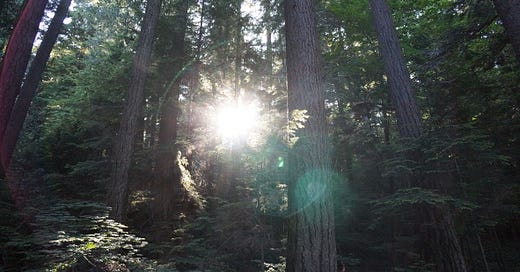




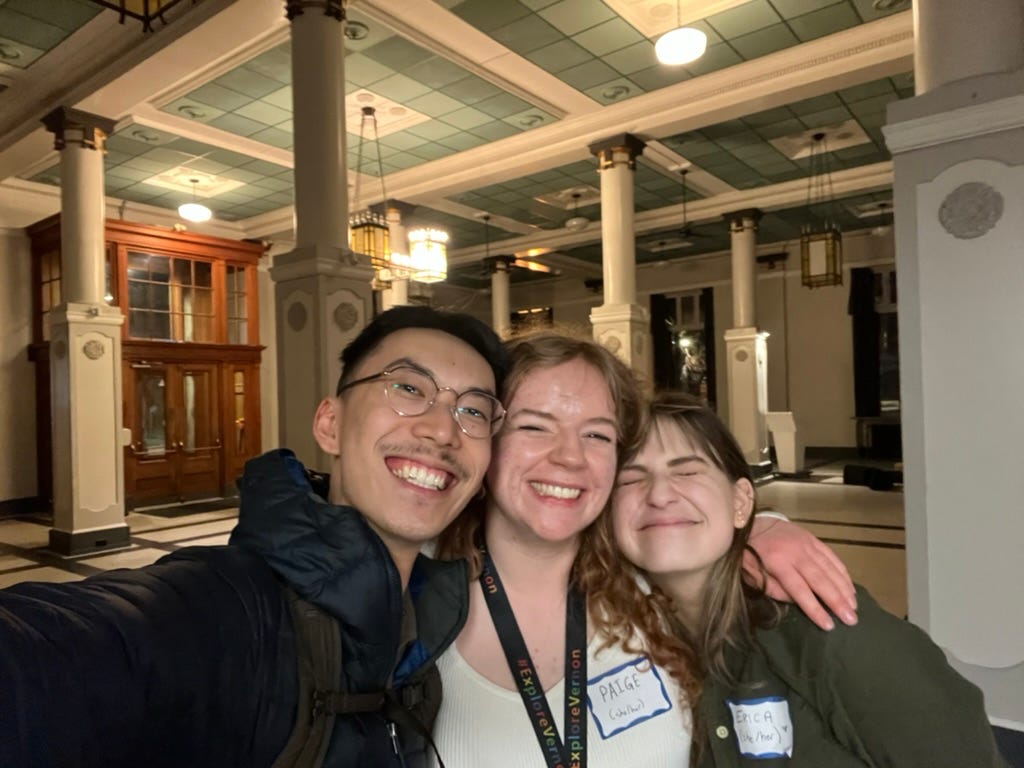
love this ! We look forward to continue to work with you all !